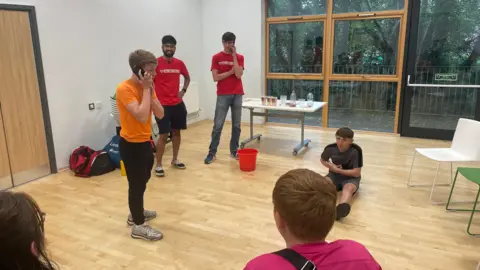The Miss World contestant taking on knife crime
 BBC
BBCMillie-Mae Adams has spent the past month carrying Wales' hopes as a contestant on the Miss World stage in India.
But the 22-year-old medical student has also used the platform to highlight what she calls the "taboo subject" of knife crime among young people.
Growing up in Caerau, Cardiff, Ms Adams said she became aware of gang violence at quite a young age.
When she left home to train as a doctor, she began teaching young people about how to deal with traumatic injuries, including stabbings.
"It's really difficult being a young person at the moment and knife crime has become so normalised that carrying a knife isn't seen as something crazy to do," said Ms Adams.
 Miss Wales/Danielle Latimer
Miss Wales/Danielle LatimerIt was during her studies to be a doctor at the University of Exeter that Ms Adams said she realised she could put her medical training to good use when she founded a branch of StreetDoctors.
The charity trains young people to deal with the physical and psychological consequences of street violence and works across 20 UK cities, including Cardiff.
"Having grown up in, I guess, a less privileged area of Cardiff, I saw quite a lot of gang violence," she said.
She said she felt "quite uneasy as a young woman walking the streets".
"I think it is quite naive to think [knife crime] won't happen on your doorstep," she added.
 Noah Seelam / Getty Images
Noah Seelam / Getty Images"Every young person deserves the chance to be equipped with the tools and knowledge to react to knife crime if they ever find themselves in that situation," Ms Adams added.
"So instead of kind of blaming young people for the issues that they face, we equip them with the tools so that if they do find themselves in that situation they know how to react."
After being crowned Miss Wales in 2023, Ms Adams qualified for the 2025 Miss World contest, choosing to highlight the issue of knife crime and StreetDoctors' work at the month-long pageant in India.
She came first in Europe for her presentation on the issue, which was one strand of the competition.
The contest reaches its climax on 31 May when the overall winner will be announced.

Ms Adams and other StreetDoctors volunteers give advice on the key steps to take if they witness a stabbing, including how to safely apply pressure and the importance of calling an ambulance.
Teenagers at St Mellons youth club in Cardiff, including Mason, 13, said the information provided by the volunteers "could be really useful in future".
"We learnt a lot about what would happen and what we would do if there was someone who was on the floor and had just been stabbed, and what we could do to save their lives," said JJ, 14.
The boys, part of the Strong Minds group, run by Cardiff Youth Service, said they feel safe in their community.
Street violence and knives was "something that you hear about more than you see", according to Luke, 14.
They do other work as part of the group including virtual reality scenarios.
Harvey, 14, said: "[The scenario] could be an argument maybe and then you've got to see how you can get out of it before it escalates into maybe a fight or a stabbing."

What should you do if someone has been stabbed?
According to StreetDoctors, these steps could save someone's life:
- Dial 999 and ask for an ambulance. They will offer you support over the phone. You will be asked why you need an ambulance and where you are. You are not required to give your name
- Check the area - make sure you are not in danger before approaching the injured person
- Apply pressure - If there is no object apply pressure directly to the wound. Try and wrap clothes or something similar around your hands. If an object is in the wound, do not remove it as the object is stopping more blood loss. Apply pressure to the wound around it
How common is knife crime?
In the year ending December 2024, there were 50 knife offences per 100,000 in Wales. The highest rate, at 67 per 100,000, was in the Gwent police force area.
However, it was 188 per 100,000 in London and 156 in the West Midlands according to ONS data.
Figures from the Youth Justice Board show that there were just over 3,200 knife or offensive weapon offences committed by children (10-17 year olds) in England and Wales in the year ending March 2024.
This is 20% greater than a decade ago but 6% fewer than the previous year and the sixth consecutive year-on-year decrease.
Adults were far more likely to commit offences with knives with over-18s making up 83% of the total.
Despite media attention on knife attacks amongst young people following the stabbing of two teachers and a pupil in Ammanford, experts warn that knife crimes should be kept in context.
Dr Rhian Croke from the Children's Legal Centre Wales said that while incidents should be addressed it was equally important "not to demonise children".
"Most may have never considered carrying or using a knife," said Dr Croke.
"Preventing knife crime means addressing the root causes.
"In areas with high deprivation, social exclusion, and neglect, children are more likely to be involved in violence."
